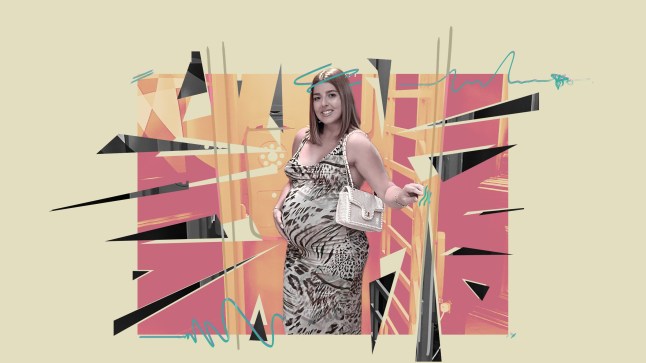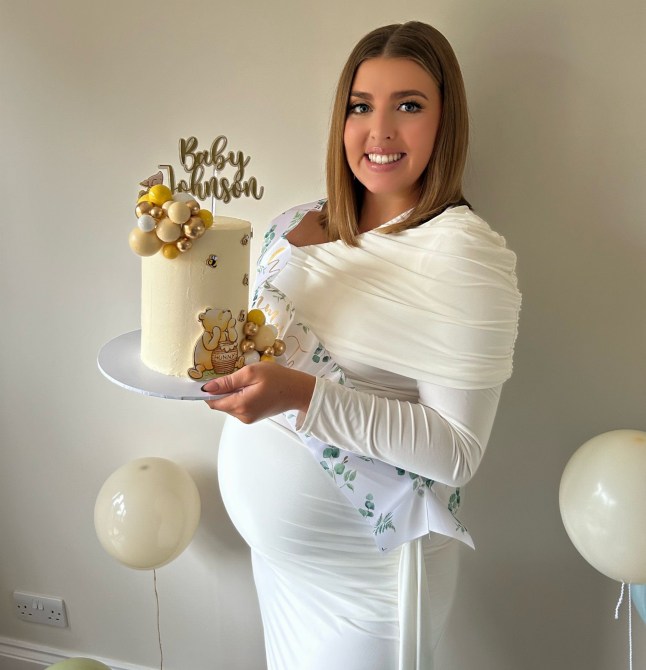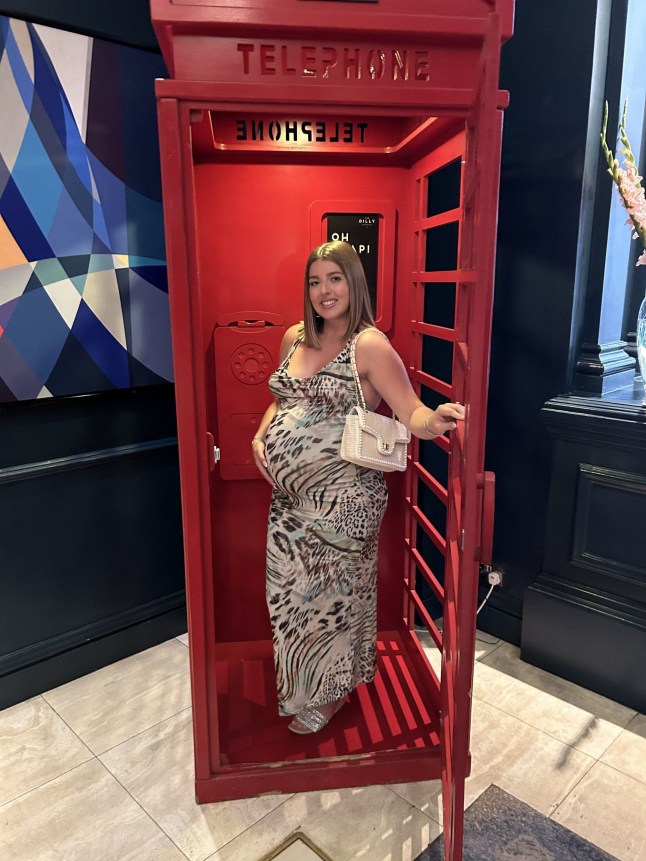15 Oct, 2025 | Admin | No Comments
I went 27 years without ADHD medication — I thought nine months would be okay


Standing in her bathroom, eyes fixed on the pregnancy test in her hand, Jodie Marie felt a rush of shock and joy as two unmistakable red lines appeared.
She and her partner had decided to start trying for their first child just a month before, and they were both surprised to have already conceived. But amid their excitement, Jodie had another aspect of her life to consider: her ADHD medication.
She’d been diagnosed with the condition in July 2024 and prescribed Elvanse, a form of stimulant used to treat it, in September 2024.
During an appointment in January, she told her healthcare professionals that she was intending to start a family this year. She was all cleared to continue taking Elvanse, but when she first learned about her pregnancy, her decision was cemented: from that day forward, she wouldn’t be taking it.
During that initial appointment, her prescriber had told her that, if she were to become pregnant, it would ultimately be her choice as to whether she continued to take the meds or not.
But after she was told that there’s still a relative level of uncertainty surrounding the meds, she decided it was time for a break.
Dr Tom Pennybacker, consultant psychiatrist and co-founder of the Chelsea Psychology Clinic, tells Metro that there’s still limited data on how safe it is to take ADHD medication throughout pregnancy.
Dr Tom says that there isn’t currently evidence that stimulants are harmful during pregnancy, but equally, there isn’t ‘enough data to say they’re completely safe.’

‘Because of this uncertainty, the usual advice is to stop where possible, though in some cases women may continue under specialist supervision if the benefits clearly outweigh the risks,’ he explains.
‘What matters most is having an open and early conversation with your prescribing clinician, so that decisions are individualised and carefully weighed.’
Now eight months pregnant, Jodie is still off her usual medication.
‘There was such a lack of definitive answer out there for me, and I always knew that the health of my baby had to come first,’ the 28-year-old, who lives in Surrey and was also diagnosed with autism as a child, tells Metro.
‘I was diagnosed with ADHD at 27. I’d gone that long without medication, and so I thought, if I’ve done 27 years, I’m sure I can do nine months now.’
‘I get distracted by a million things’
Throughout her pregnancy, Jodie recognises that she’s been ‘very fortunate’ for it to have been relatively smooth sailing. However, life without her medication has had its difficulties.
‘I’ve really noticed a difference in my ability to sit and concentrate and focus on something for a long period of time. I’ll sit and do something for two minutes, and I’m then picking up my phone, going to the kitchen, and getting distracted by a million other things,’ the complaints manager says.
After she was diagnosed and started medication initially, Jodie realised just how challenging even small things had been for her previously.
Thanks to that first tiny blue pill, she could finally sit and concentrate, ‘getting things done’ without losing an hour of time into thin air.
Likewise, throughout her pregnancy, she’s noticed that the ‘intense food noise’ has slowly crept back into her life.
‘It’s eating a meal and then thinking, “what am I going to eat next? Where am I going to get that from?” I’m wanting to snack constantly, and again, I think that’s because I’m looking for dopamine,’ she reflects.
Initially, she put this down to her baby bump – but as time has gone on, she doesn’t believe ‘it’s to do with the pregnancy at all.’
‘I’m finding it very difficult. I’m searching for dopamine in food that I just don’t need, hunger-wise,’ she explains, noting the difference between regular pregnancy cravings and a potential lack of ADHD medication.
‘Mentally, that’s a difficult battle because I don’t know if I’m eating because I’m hungrier during pregnancy or because I’m searching for a lack of dopamine. It’s played a part in my difficulty with my body image.’
‘Combining that with your usual pregnancy symptoms of feeling fatigued and achy, it makes it harder at work. If I could have kept on taking it, I would have, but I couldn’t take the risk.’
Luckily, as a manager, Jodie has autonomy over her work days. She works from home and finds that she’s able to give herself a bit of extra ‘grace’ when she needs it – something her seniors have signed off on.
‘I’ll force myself into that focused state with things like Pomodoro Timers, but again, setting those doesn’t stop you from picking up your phone if you’re getting distracted,’ she notes, adding that her colleagues have been supportive of both her pregnancy and her choice to stay off the medication for now.

Now that motherhood is almost upon her, Jodie feels eternally grateful – and excited – for the future. But she can’t help but feel that society still doesn’t give ADHD and pregnancy the time and research it deserves.
‘I don’t feel that society knows enough about ADHD at all, never mind how it can present in women specifically and how it can impact them during pregnancy,’ Jodie says.
‘We’re given the stereotypical presentations in young boys, but not so much information on the nuances the diagnosis can present for women.’
Despite the difficulties that living without the medication for now has brought, Jodie doesn’t regret it for an instant.
‘I’m so grateful to have been blessed with a healthy pregnancy. I do wish there were a way to have both, but until that time, I will always be glad I put my baby boy’s health before any need of my own,’ she concludes.
‘My time to take ADHD medications again will be here before I know it, and pregnancy is such a short timeframe in comparison to the rest of my life.’
Outside of pregnancy, ADHD in women is still chronically underdiagnosed and under-researched: the ADHD Foundation estimates that between 50 and 70% of the 1,000,000 women in the UK living with ADHD remain undiagnosed.
Jodie isn’t alone. TikTok reveals swathes of people with ADHD discussing the intricacies of pregnancy. One post from @harliebriggsart shows her nursing her blossoming bump, but her joy has bittersweet undertones: ‘Happily growing my baby, but my brain is so loud and difficult without my ADHD medication. It’s quite a struggle.’
@flourishwithadhd adds: ‘When I first got pregnant, I thought I was going to burn my business to the ground.’ She’d spent five years being ‘fully medicated,’ and going from that to nothing at all within ‘the span of a day was rough.’
‘Pregnancy is beautiful but not always easy. Nobody talks about how hard it is to go off ADHD meds while growing a tiny human…brain fog, nausea, emotions, and all,’ @jayhiltt writes. ‘But we do it all for our babies.’
‘The fact my partner hasn't left me is a miracle’
Unlike Jodie, for Eleanor Bell, it was post-partum that revealed her symptoms. She was diagnosed with combined ADHD in August 2025 – and now has a one-year-old, born in September 2024. She’s currently waiting for her first appointment to discuss medication.
‘I paid for a diagnosis privately, as at times, I honestly felt like I was going insane. The emotional dysregulation sent me into complete and utter overdrive,’ the 29-year-old PR consultant from Leeds tells Metro.
‘The fact my partner hasn’t left me is a miracle, and he deserves a medal. This condition is far more complex than I ever realised, but weirdly, during pregnancy I felt the best emotionally I have ever felt in my whole life.’
Though she’d wondered whether she had it before after a friend was diagnosed, it was post-partum that triggered her to seek help.
She recalls: ‘My poor partner sat me down and said, “I can’t deal with how intense these mood swings are and dysregulated you are.” I never had post-partum depression, but that whole juggling thing after having a baby made me realise that I really needed some answers.’
As Dr Tom adds, there’s ‘emerging evidence’ that suggests that women with ADHD could be at higher risk of post-natal depression – though Elle acknowledges that she was never diagnosed with this. He explains: ‘This is partly because of biological vulnerabilities but also because of the additional challenges around organisation, sleep and emotional regulation when caring for a newborn.’
Some women, like Eleanor, say that they actually feel more settled emotionally throughout pregnancy – even without medication.
Dr Tom theorises: ‘One possible explanation [for this] is that higher oestrogen in the second trimester can temporarily boost dopamine, leading to a sense of improved stability.’
Do people always stop taking ADHD medication throughout pregnancy?
It’s worth noting that there are lots of different types of ADHD medications – some of which are stimulants, and some of which aren’t.
Forms commonly prescribed to adults by the NHS include methylphenidate (which includes brand names like Ritalin and Concerta) and lisdexamfetamine (including Elvanse), while non-stimulants cover drugs like atomoxetine and guanfacine, often recommended for those who either struggle with the side effects of stimulants or simply don’t want to be on them.
Even without ADHD, pregnancy brings considerable hormonal shifts, particularly in oestrogen and progesterone. As Dr Tom explains, oestrogen is actually responsible for supporting dopamine activity in the brain – and this is ‘closely tied to attention and executive function.’
People with ADHD are also naturally deficient in it and so might seek dopamine hits externally – whether from caffeine, sugar highs, exercise, or scrolling on social media – particularly without medication.
He says: ‘When levels fluctuate, it can worsen difficulties with focus, organisation and mood regulation – things already challenging in ADHD.’
Some people also might also decide alongside their doctors to continue taking medication, and it’s important to note that all of these pathways are valid.
Much like women shouldn’t be shamed if they choose to drink a small amount of caffeine throughout their pregnancies, the same is true of meds.
Research does suggest that the majority of women do choose to come off their medication throughout pregnancy, as one 2023 study by ADDitude saw 2% of respondents (who had previously been pregnant) continue to take their meds. Some were worried about the impact it could have on their baby’s health, while others simply weren’t diagnosed at the time.
‘We need more open dialogue’
Every person with ADHD is different, and the same goes for every pregnant person with ADHD. Dr Tom says that having strong support structures – whether at home or in the workplace – can ‘make a big difference’ to mental and emotional wellbeing throughout these nine months.
For those who might’ve chosen not to take their meds during pregnancy and are subsequently struggling, he suggests leaning into both ‘structure and routine wherever possible.’
Above all, though, it’s critical to always keep in touch with the healthcare professionals responsible for diagnosing and prescribing in the first place, who’ll be able to adjust plans. Medication should never be tampered with without it being signed off by a doctor first.
Looking to the future, Dr Tom hopes to encourage more ‘open dialogue’ as well as research into ADHD and pregnancy. In his view, it ‘isn’t spoken about enough.’
‘Women are often left feeling like they must choose between their own wellbeing and their baby’s, which is a huge emotional burden,’ he concludes.
‘No woman should feel she has to navigate this alone. ADHD and pregnancy is a complex area, but with good communication and tailored support, women can find safe and workable ways through it.’
ADHD Awareness Month
Taking place every October, the theme for this year’s ADHD Awareness Month is ‘The Many Faces of ADHD.’
But it’s not just neurodivergent people who should care about ADHD: there’s value in those without the condition understanding it, too. No amount of awareness is too great, and one of the best things neurotypical people can do for us is give us allyship.
With that in mind, Metro Lifestyle will be embarking on a weekly series of ADHD content throughout October that aims to demystify what it truly means to live with this vastly misunderstood condition.
Our brains are a little bit different, and that’s okay. Now, let us tell you all about it.
Do you have a story to share?
Get in touch by emailing MetroLifestyleTeam@Metro.co.uk.
Write Reviews
Leave a Comment
No Comments & Reviews